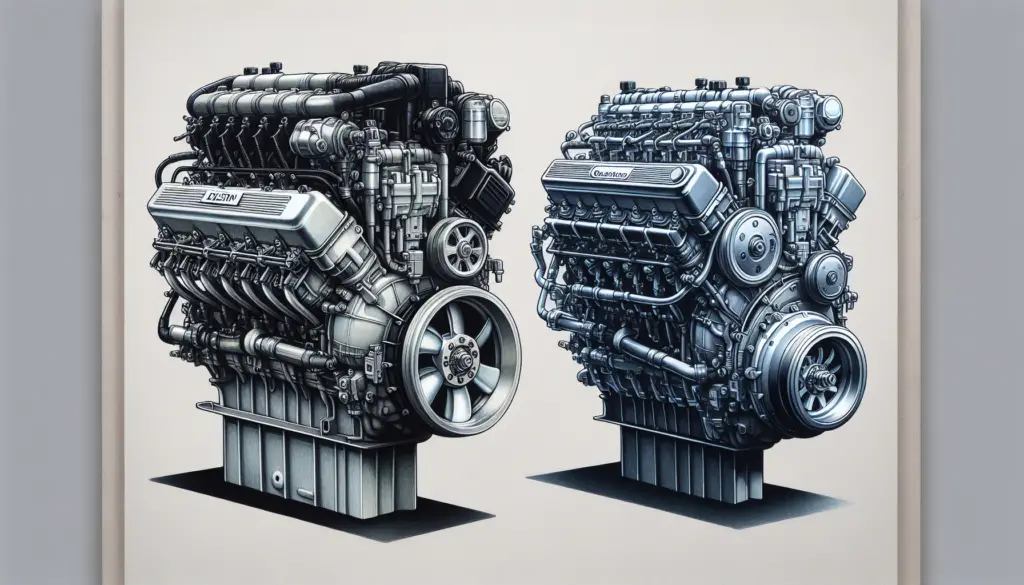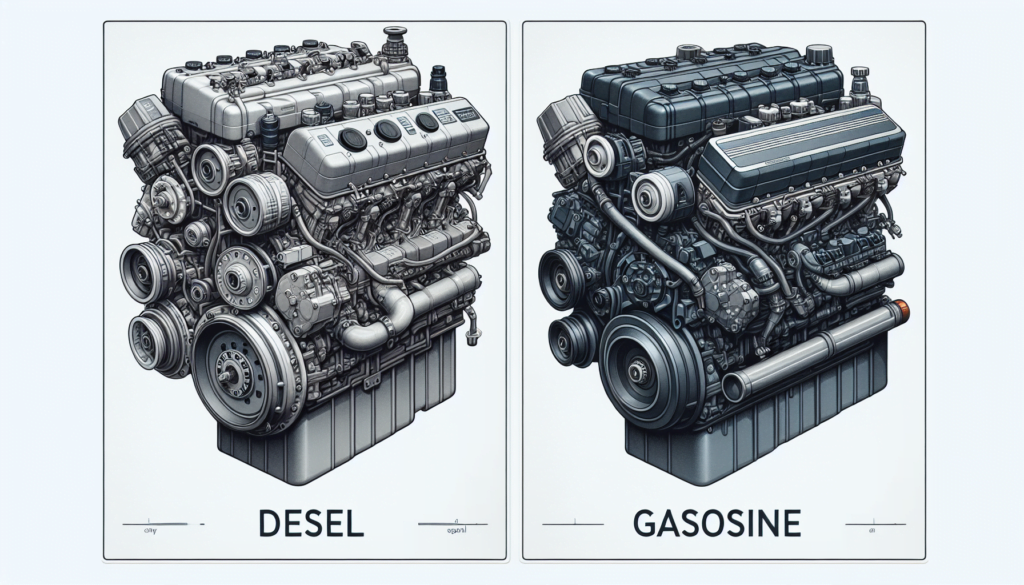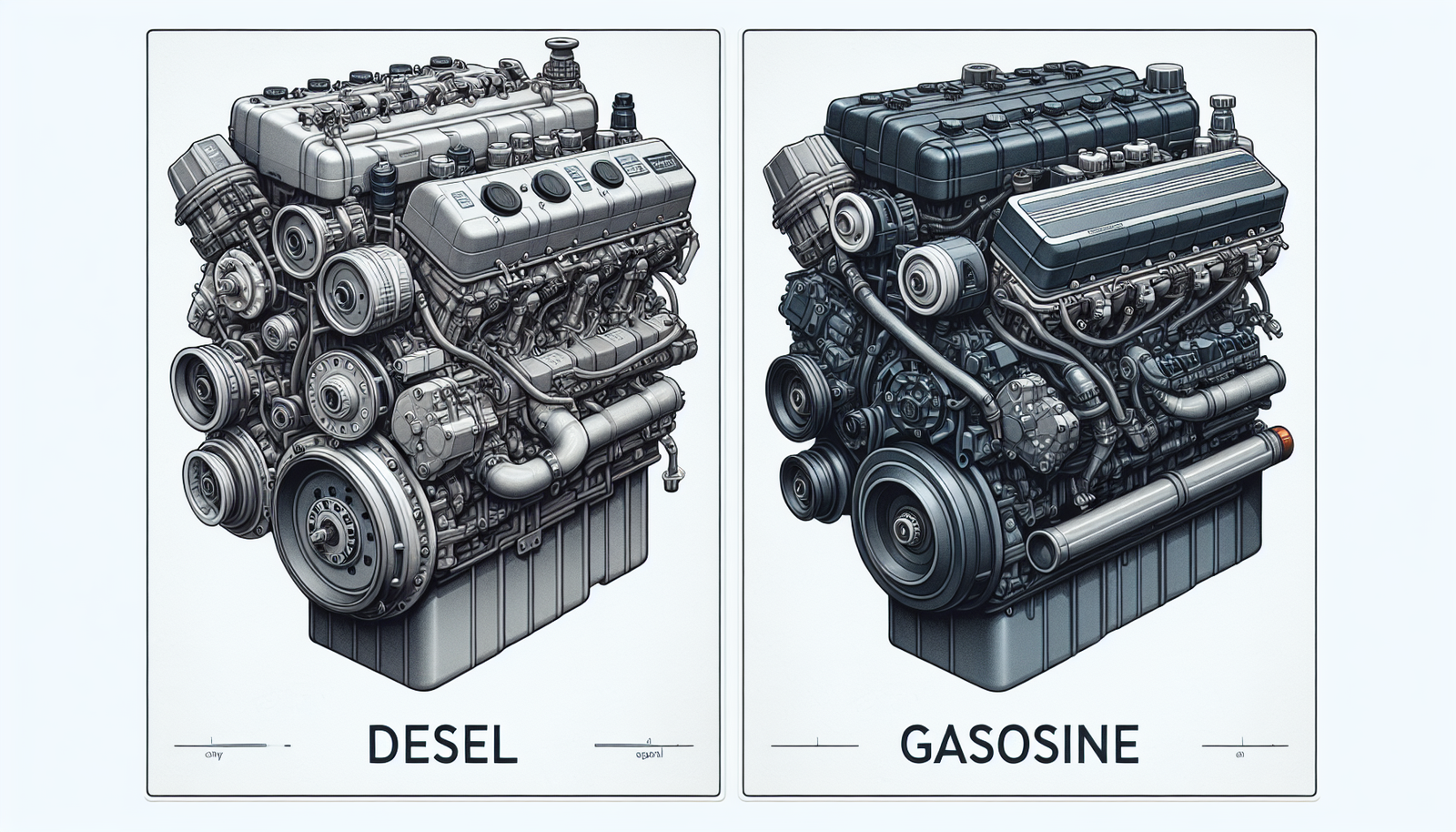Have you ever been torn between choosing a diesel or gasoline engine for your boat? If so, you’re not alone. In “What Are The Key Differences Between Diesel and Gasoline Boat Engines?,” we’ll explore and compare both of these common engine types. Through the exploration of the main features, various advantages, and potential limitations, you’ll gain a better understanding of each, helping you make a more informed decision. Whether you’re a seasoned boat owner or a newcomer to the world of boating, this guide offers a comprehensive comparison to simplify your choice. So, get ready to learn more about diesel and gasoline boat engines, and let this knowledge steer you towards the perfect fit for you and your vessel.

Engineering and Design
When understanding the key differences between diesel and gasoline boat engines, one must first consider variations in their engineering and design.
Basic construction differences
These engines are built differently to cater to their specific functions. A gasoline engine operates through the internal combustion process; it uses a spark plug to ignite a mixture of gasoline and air in its cylinder, causing a small explosion that powers the piston. Diesel engine, on the other hand, ignites by compression; the air in the cylinder is compressed, and then diesel fuel is injected. The air’s high temperature causes the diesel to ignite spontaneously, pushing the piston.
Purpose of different design approaches
These design differences serve different purposes. Gasoline engines, known for their high RPMs are designed for quick acceleration. On the other hand, diesel engines have lower RPMs but more torque. This makes them ideal for carrying heavy loads and long-distance, steady-speed cruising, where lot of power isn’t required all at once.
Performance and Efficiency
Performance and efficiency are also crucial factors that enroll in the gasoline vs diesel engine debate.
Power output comparison
Among the key aspects of power output, diesel engines usually have more torque and are more efficient at converting fuel into power, making them ideal for heavy duty boats. However, gasoline engines often have higher RPM capabilities, meaning they can reach higher speeds more quickly.
Fuel efficiency
Generally, diesel engines are more fuel-efficient than gasoline ones. They use their fuel to create power directly, resulting in less waste. That’s why diesel fuel has a higher energy density than gasoline which makes a diesel engine boat operate more miles per gallon than a gasoline boat.
Engine lifespan & reliability
Diesel engines are often touted for their longevity and reliability. They have fewer parts than gasoline engines, meaning there’s less that can go wrong. They’re built tougher to withstand the high compression ratios and are known to outlive their gasoline counterparts.
Fuel Type Characteristics
Fuel type has a significant impact on engine functionality, availability, cost, and much more.
Quality of fuel used
Regarding the fuel quality, diesel is less refined than gasoline, but it has a higher energy density. Gasoline is more volatile and burns easier, making it suitable for engines that need to hit high RPMs quickly.
Availability & cost of Diesel vs Gasoline
The availability and cost of diesel compared to gasoline can vary depending on the region. Generally, diesel is more widely available in marine applications and is often cheaper than gasoline, although it can sometimes be more expensive due to higher demand from commercial and industrial sectors.
Impact of fuel type on engine’s functionality
The fuel type strongly affects the engine’s functionality. The volatile nature of gasoline can lead to quicker ignition and higher RPMs, supporting faster speeds. However, this can potentially lead to higher fuel consumption. Conversely, the higher energy density of diesel allows for better fuel economy and torque, but at lower RPMs.

Environmental Impact
Both diesel and gasoline engines have a significant environmental impact, in different ways.
Emission levels
When it comes to emissions, diesel engines emit less carbon dioxide than gasoline counterparts, but note that they produce more particulates and nitrogen oxide, which can cause air quality issues.
Fuel spill impact
In case of a fuel spill, diesel fuel is less harmful as it evaporates slower than gasoline and is less likely to ignite. Gasoline evaporates quicker, causing more harm to marine life.
Effect of engine noise on marine life
Noise pollution is another concern, and research suggests that the low-frequency noise produced by boat engines, particularly diesels, may affect marine life.
Maintenance and Servicing
While diesel and gasoline engines have different maintenance and servicing requirements, they both need regular check-ups to ensure a long and efficient lifespan.
Routine maintenance comparison
Diesel engines require less routine maintenance and have longer service intervals because they have fewer parts and don’t have spark plugs or distributors that need replacing. Gasoline engines require more regular tune-ups and part replacements.
Availability of parts and services
Although both types of engines have a wide range of parts and services available, gasoline engine parts and services tend to be more accessible due to the abundance of gasoline cars and boats.
Cost of maintenance and repairs
While diesel engines may require less frequent service, the cost of maintenance and repair can be higher due to the robust nature of the parts and the specialist knowledge required to service them. The parts for gasoline engines, while needing more frequent replacement, are usually cheaper individually.
Safety Considerations
Both engines have certain safety risks, but precautions, good maintenance and safe practices can mitigate many of these.
Risk of fire and explosion
Gasoline is much more volatile and easier to ignite than diesel fuel, resulting in a higher risk of fire or explosion.
Stability of gasoline vs diesel engines
Diesel engines are often viewed as more stable and less prone to unexpected breakdowns thanks to their robust construction. However, gasoline engines with regular maintenance can also provide reliable service.
Best safety practices for each engine type
For both engine types, consistent maintenance, proper storage of fuel, and understanding the operation of their respective safety features will enhance their safe use.
Boat Size and Type
The type and size of the boat will often dictate the engine type.
Common engine usage based on boat type
Generally, diesel engines are popular in commercial and larger recreational boats, thanks to their fuel efficiency and torque benefits. Conversely, gasoline engines are typically found in smaller, personal boats that prioritize speed and quick acceleration.
Ideal boat sizes for each engine type
As a rule, diesel engines are well suited for larger boats (over 35 feet) that need power and fuel efficiency. Gasoline engines are better for smaller, lighter boats that favor speed and acceleration.
Operational Costs
Boat owners must also weigh the costs associated with each type of engine.
Initial purchase cost
Gasoline engines are often less expensive initially compared to diesel engines, but the latter’s longer lifespan and better fuel efficiency can balance this out in the long run.
Cost of ownership over time
Over time, the cost of ownership can be less with diesel due to their fuel efficiency, greater durability, and less frequent need for maintenance.
Fuel consumption cost
Given that diesel engines typically provide better fuel efficiency, the fuel consumption cost can be lower with diesel, especially for longer travel distances.
Resale Value
Thinking about resale value is also an important aspect to consider when choosing an engine.
Market trends in resale value
Market trends indicate that boats with diesel engines often hold their value better. Thanks to their longevity, they can be sold with the promise of many more years of reliable service.
Potential impact of engine type on resale price
The engine type can significantly impact the resale price. Although diesel engines have a higher upfront cost and potentially higher maintenance costs, their durability, and longevity can translate to a higher resale price compared to gasoline engines.
Choice Based on Usage
Finally, the best choice of boat engine often comes down to specific usage requirements.
Best scenarios to use a diesel engine
If you have a larger boat, value fuel efficiency, need to travel long distances, or carry heavy loads, a diesel engine might be the best choice. Despite the potentially higher upfront cost, the benefits could result in lower costs and better performance in the long run.
Best scenarios to use a gasoline engine
If you have a smaller, speedier boat, primarily used for short trips, or if upfront cost is a significant determinant, then a gasoline engine may be the better choice. They can deliver the quick acceleration and high RPMs that are ideal for fast, fun, and sporty boating.
When deciding between a diesel vs gasoline boat engine, consider these key differences and choose based on what best aligns with your boating needs, financial considerations, and environmental priorities.

